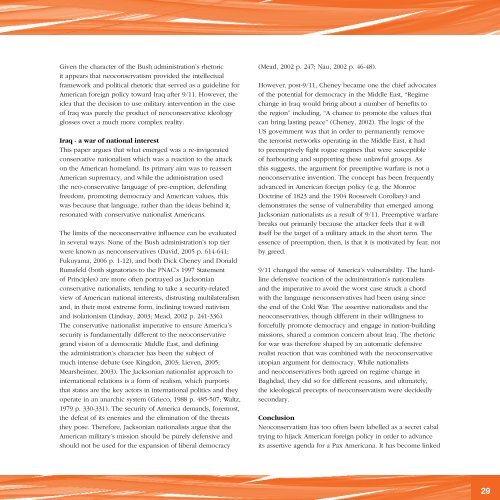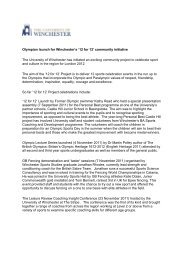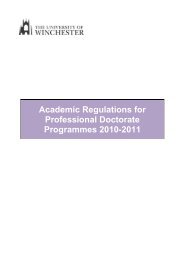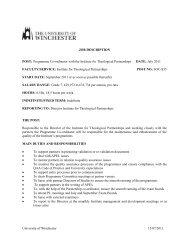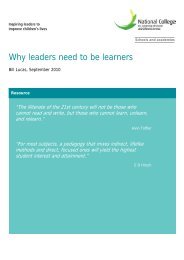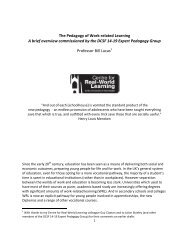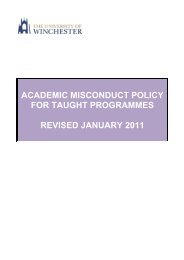alfred 2 - University of Winchester
alfred 2 - University of Winchester
alfred 2 - University of Winchester
You also want an ePaper? Increase the reach of your titles
YUMPU automatically turns print PDFs into web optimized ePapers that Google loves.
Given the character <strong>of</strong> the Bush administration’s rhetoric<br />
it appears that neoconservatism provided the intellectual<br />
framework and political rhetoric that served as a guideline for<br />
American foreign policy toward Iraq after 9/11. However, the<br />
idea that the decision to use military intervention in the case<br />
<strong>of</strong> Iraq was purely the product <strong>of</strong> neoconservative ideology<br />
glosses over a much more complex reality.<br />
Iraq - a war <strong>of</strong> national interest<br />
This paper argues that what emerged was a re-invigorated<br />
conservative nationalism which was a reaction to the attack<br />
on the American homeland. Its primary aim was to reassert<br />
American supremacy, and while the administration used<br />
the neo-conservative language <strong>of</strong> pre-emption, defending<br />
freedom, promoting democracy and American values, this<br />
was because that language, rather than the ideas behind it,<br />
resonated with conservative nationalist Americans.<br />
The limits <strong>of</strong> the neoconservative influence can be evaluated<br />
in several ways. None <strong>of</strong> the Bush administration’s top tier<br />
were known as neoconservatives (David, 2005 p. 614-641;<br />
Fukuyama, 2006 p. 1-12), and both Dick Cheney and Donald<br />
Rumsfeld (both signatories to the PNAC’s 1997 Statement<br />
<strong>of</strong> Principles) are more <strong>of</strong>ten portrayed as Jacksonian<br />
conservative nationalists, tending to take a security-related<br />
view <strong>of</strong> American national interests, distrusting multilateralism<br />
and, in their most extreme form, inclining toward nativism<br />
and isolationism (Lindsay, 2003; Mead, 2002 p. 241-336).<br />
The conservative nationalist imperative to ensure America’s<br />
security is fundamentally different to the neoconservative<br />
grand vision <strong>of</strong> a democratic Middle East, and defining<br />
the administration’s character has been the subject <strong>of</strong><br />
much intense debate (see Kingdon, 2003; Lieven, 2005;<br />
Mearsheimer, 2003). The Jacksonian nationalist approach to<br />
international relations is a form <strong>of</strong> realism, which purports<br />
that states are the key actors in international politics and they<br />
operate in an anarchic system (Grieco, 1988 p. 485-507; Waltz,<br />
1979 p. 330-331). The security <strong>of</strong> America demands, foremost,<br />
the defeat <strong>of</strong> its enemies and the elimination <strong>of</strong> the threats<br />
they pose. Therefore, Jacksonian nationalists argue that the<br />
American military’s mission should be purely defensive and<br />
should not be used for the expansion <strong>of</strong> liberal democracy<br />
(Mead, 2002 p. 247; Nau, 2002 p. 46-48).<br />
However, post-9/11, Cheney became one the chief advocates<br />
<strong>of</strong> the potential for democracy in the Middle East, “Regime<br />
change in Iraq would bring about a number <strong>of</strong> benefits to<br />
the region” including, “A chance to promote the values that<br />
can bring lasting peace” (Cheney, 2002). The logic <strong>of</strong> the<br />
US government was that in order to permanently remove<br />
the terrorist networks operating in the Middle East, it had<br />
to preemptively fight rogue regimes that were susceptible<br />
<strong>of</strong> harbouring and supporting these unlawful groups. As<br />
this suggests, the argument for preemptive warfare is not a<br />
neoconservative invention. The concept has been frequently<br />
advanced in American foreign policy (e.g. the Monroe<br />
Doctrine <strong>of</strong> 1823 and the 1904 Roosevelt Corollary) and<br />
demonstrates the sense <strong>of</strong> vulnerability that emerged among<br />
Jacksonian nationalists as a result <strong>of</strong> 9/11. Preemptive warfare<br />
breaks out primarily because the attacker feels that it will<br />
itself be the target <strong>of</strong> a military attack in the short term. The<br />
essence <strong>of</strong> preemption, then, is that it is motivated by fear, not<br />
by greed.<br />
9/11 changed the sense <strong>of</strong> America’s vulnerability. The hardline<br />
defensive reaction <strong>of</strong> the administration’s nationalists<br />
and the imperative to avoid the worst case struck a chord<br />
with the language neoconservatives had been using since<br />
the end <strong>of</strong> the Cold War. The assertive nationalists and the<br />
neoconservatives, though different in their willingness to<br />
forcefully promote democracy and engage in nation-building<br />
missions, shared a common concern about Iraq. The rhetoric<br />
for war was therefore shaped by an automatic defensive<br />
realist reaction that was combined with the neoconservative<br />
utopian argument for democracy. While nationalists<br />
and neoconservatives both agreed on regime change in<br />
Baghdad, they did so for different reasons, and ultimately,<br />
the ideological precepts <strong>of</strong> neoconservatism were decidedly<br />
secondary.<br />
Conclusion<br />
Neoconservatism has too <strong>of</strong>ten been labelled as a secret cabal<br />
trying to hijack American foreign policy in order to advance<br />
its assertive agenda for a Pax Americana. It has become linked<br />
29


